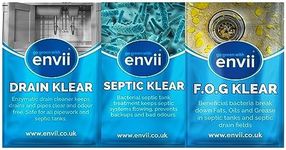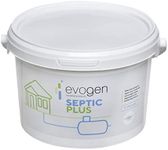Buying Guide for the Best Septic Tank Treatments
Choosing the right septic tank treatment is crucial for maintaining the health and efficiency of your septic system. A good treatment can help break down waste, prevent clogs, and reduce odors, ultimately extending the life of your septic system. When selecting a septic tank treatment, consider the specific needs of your household, the size of your septic system, and any environmental concerns. Understanding the key specifications of septic tank treatments will help you make an informed decision that best suits your situation.Type of TreatmentSeptic tank treatments come in various forms, including liquids, powders, and tablets. The type of treatment you choose can affect how easy it is to use and how effective it is. Liquid treatments are often easy to pour and distribute evenly, while powders can be mixed with water for application. Tablets are convenient and can be simply flushed down the toilet. Consider your preference for application and the specific needs of your septic system when choosing the type of treatment.
Active IngredientsThe active ingredients in septic tank treatments are responsible for breaking down waste and maintaining the balance of bacteria in your tank. Common ingredients include bacteria, enzymes, and chemicals. Bacteria-based treatments are natural and help maintain a healthy bacterial balance, while enzyme-based treatments break down waste materials. Chemical treatments can be more aggressive but may harm the natural bacteria in your tank. Choose a treatment with active ingredients that align with your environmental concerns and the specific issues you are facing, such as clogs or odors.
Frequency of UseThe frequency with which you need to apply a septic tank treatment can vary based on the product and your system's needs. Some treatments are designed for monthly use, while others may be used quarterly or even annually. More frequent treatments can help maintain a consistent bacterial balance, while less frequent treatments may be more convenient. Consider your lifestyle and how often you are willing to apply the treatment when deciding on the frequency of use.
Tank Size CompatibilitySeptic tank treatments are often formulated for specific tank sizes, so it's important to choose a product that matches the capacity of your system. Using a treatment designed for a smaller tank in a larger system may not be effective, while using a treatment for a larger tank in a smaller system could be wasteful. Check the product label for tank size recommendations and ensure it aligns with your septic system's capacity.
Environmental ImpactThe environmental impact of septic tank treatments is an important consideration, especially if you are concerned about the effects on local ecosystems. Some treatments are eco-friendly and biodegradable, minimizing their impact on the environment. Others may contain harsh chemicals that can be harmful to the surrounding soil and water. If environmental impact is a priority for you, look for treatments labeled as environmentally safe or biodegradable.
















